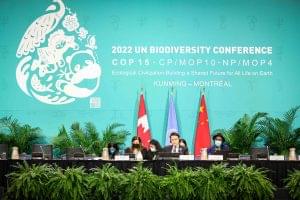The agreement was reached at the UN Biodiversity Summit
The UN Conference on Biological Diversity has set a historic goal to restore our relationship with nature. As the culmination of four years of negotiations, the countries of the world adopted the Kunming-Montreal Global Biodiversity Conservation Framework Strategy. This world strategy sets the course of action for the next decade to deal with the ecological crisis threatening humanity.

(Photo: Istvan Fekete)
At the plenary session of the Montreal Biodiversity Summit, which lasted until dawn, a compromise package consisting of six resolutions was adopted. The most important element of this is the Kunming-Montreal Global Biodiversity Conservation Framework Strategy (GBF). In addition, a decision was made on issues closely related to it, i.e. the mobilization of resources necessary for the implementation of the framework strategy, the monitoring of the implementation of global plans, and the issue of access to digital sequence information from genetic resources and the fair sharing of benefits from their use. The goals include protecting 30 percent of the world’s terrestrial, freshwater, marine, and coastal areas by 2030, and mobilizing at least $200 billion annually in domestic and international biodiversity-related funding from public and private sources by 2030. In addition, the countries of the world undertake to reduce or transform subsidies deemed harmful to nature by at least 500 billion dollars by 2030. Economically developed countries undertake to support developing countries with at least 20 billion dollars a year until 2025 and at least 30 billion dollars a year until 2030 in the implementation of the goals of the biodiversity framework strategy.
AM
Related news
AM: One of Hungary’s greatest strategic assets is good-quality fertile soil
🎧 Hallgasd a cikket: Lejátszás Szünet Folytatás Leállítás Nyelv: Auto…
Read more >Related news
Home Start loan: MBH Bank has raised the stakes
🎧 Hallgasd a cikket: Lejátszás Szünet Folytatás Leállítás Nyelv: Auto…
Read more >








